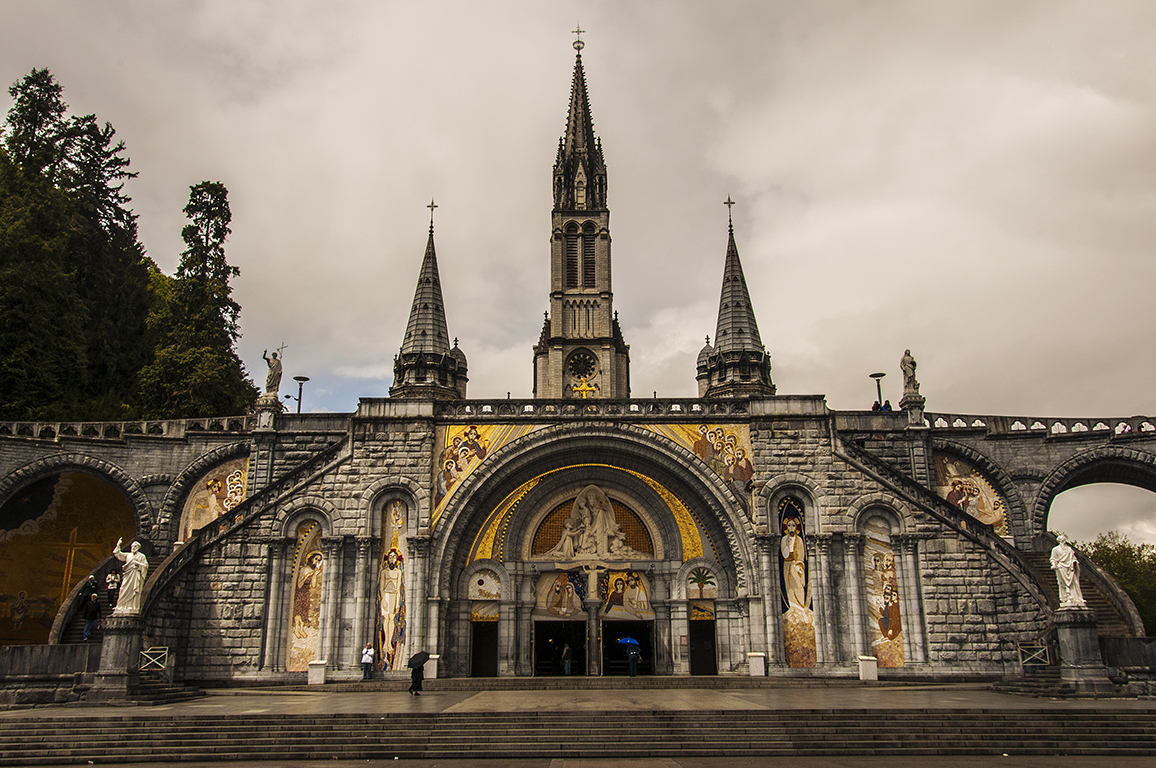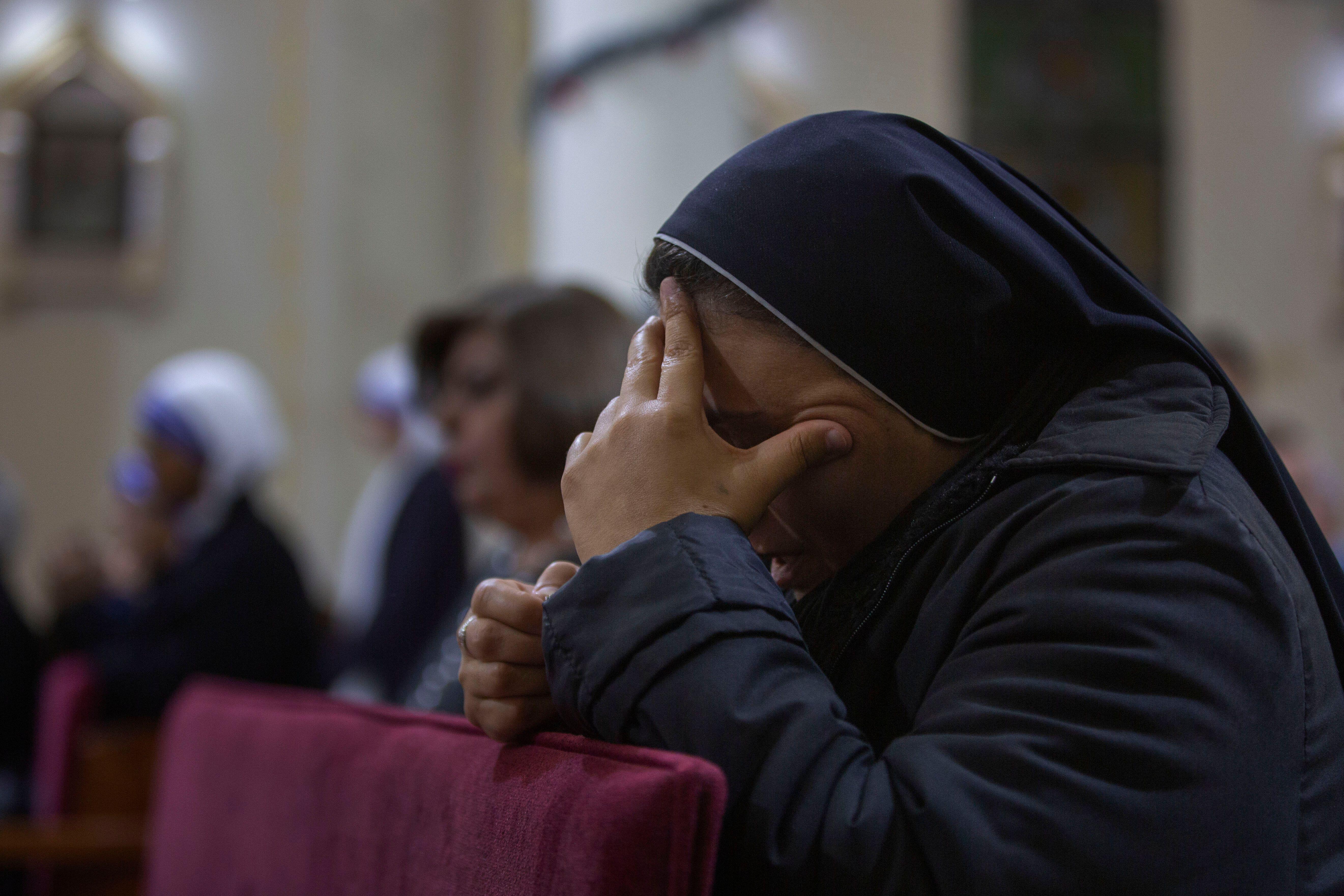One of the last remaining religious sisters in the Catholic parish of the Holy Family in Gaza has appealed “for peace, for respect for human rights”.
Sr Nabila Saleh of the Congregation of the Rosary said that “houses no longer exist, food is almost finished, and what little is found costs five times more than usual”.
Around 120 of the 1,000 people who took shelter in the parish at the start of the war have left Gaza using emergency visas or foreign nationality.
Sr Nabila was one of two members of her congregation – the only congregation of sisters based in the Latin Patriarchate of Jerusalem – who ran the Catholic school in Gaza for roughly 400 Christian and Muslim pupils.
Following the outbreak of hostilities, they continued to teach the catechism and care for the children in the parish, who have now missed almost half a year of schooling, but one sister has been evacuated and Sr Nabila was due to leave this week suffering exhaustion.
“We hope in the Lord. If we did not have faith here, we would be all be dead already,” she said in her appeal, delivered to Vatican News during a rare moment of contact with the outside world.
It is uncertain whether the Rosary Sisters, who operate across the Middle East, will be able to restore their presence in Gaza in the future.
The Catholic community there is currently served by its Argentinian parish priest, Fr Youssef Asaad, and two sisters from the Incarnate Word institutes, while three sisters of the Missionaries of Charity run a home for the disable in the parish compound.
The blockade of Gaza has driven food prices beyond the means of most civilians, while a moratorium on imports of fuel – for fear it could be used for Hamas equipment – means that the parish is rarely able to run its generator.
John Adam Fox, chairman of the charity Fellowship and Aid to the Christians of the East which supports the Latin patriarchate, told The Tablet that there were people sheltering in the Holy Family parish with visas to leave Gaza who did not wish to abandon the community.
“The future of the Holy Family parish – indeed, of Christianity in Gaza per se – depends on the survival of Gaza as an independent state,” he said, “because it is in this historic, multi-faith, close-knit community that Muslims and Christians have co-existed peaceably together for centuries, exchanging culture, commerce, education and friendship.”
He said the region could become prosperous if it was connected with the regional economy.
“Freed from the yoke of isolation and incarceration, Gazan society would quickly recover the enterprising character of its ancient heritage as a principal port and trading hub between the Arabian Peninsula and the Mediterranean, and would thereby find a pathway to become once again an integral part and beneficiary of the Middle Eastern economy.”
Following the interim ruling by the International Court of Justice (ICJ) last month that there is enough evidence for it to hear South Africa’s genocide case against Israel, Pax Christi renewed its demand for a ceasefire after a reported 26,000 deaths in Gaza since the 7 October Hamas attack.
“The staggering loss of life and unfathomable misery visited upon the innocent Gazan population, nearly half of whom are children, must end now,” it said on 31 January, joining a call by human rights organisations “to halt the transfer of weapons, parts and ammunition to Israel and Palestinian armed groups while there is a risk they are used to commit or facilitate serious violations of international humanitarian or human rights law”.
Pax Christi also called for a “thorough, independent, and transparent” investigation of reports that 12 UN Relief and Works Agency (UNRWA) employees were implicated in the 7 October attack.
However, it opposed the withdrawal of states’ funding from UNRWA, which is “the lifeline to the 1.7 million refugees in Gaza who depend on it for their survival” and urged that “the tireless work of UNRWA’s 13,000 workers in Gaza, who have lost over 150 of their colleagues and suffered personal losses and displacement, must continue with the full support of the international community”.
Jordan’s foreign minister Ayman Safadi emphasised the importance of UNRWA’s role in helping Palestinians cope with the humanitarian catastrophe in Gaza, saying it cannot be “replaced”, during a telephone call last week with his British counterpart, David Cameron.
According to the Jordanian Foreign Ministry, the call “focused on the situation in Gaza and the efforts made to reach a ceasefire agreement and bring humanitarian aid into Gaza”.
The director of Caritas Jordan, Wael Suleiman, also said that halting funding to UNWRA by 11 countries, including the US and the UK, is a “senseless” act. He added that without funding, aid operations may not be guaranteed “beyond the end of February”.
These concerns echoed criticism by 20 non-governmental organisations, including Caritas Internationalis, that the suspension of funding by donor states will impact life-saving assistance for over two million civilians, over half of whom are children, who rely on UNRWA aid in Gaza.
With more than one million displaced Palestinians using the 154 UNRWA shelters in the region, the agency and aid organisations said the countries suspending funds risk further depriving Palestinians in the region of essential food, water, medical assistance and supplies.
In a letter published in The Times on 31 January, Christian Aid, Global Justice Now, Oxfam and War on Want urged the UK government “to call for an immediate and unconditional ceasefire and halt arms sales to Israel and Palestinian arms groups while there is a risk they are used to commit or facilitate serious violations of international humanitarian or human rights law”.
It said the government is currently “complicit in the slaughter of innocent civilians taking place every day in Gaza” and has emboldened Israeli Prime Minister Benjamin Netanyahu’s government “to pursue what amounts to a policy of collective punishment against the people of Gaza”.
In the West Bank, the Latin patriarchate condemned an “unprovoked and shameful assault” on the Abbot of the Abbey of Dormition in Jerusalem last Saturday. A video of the incident showed two youths approaching Abbot Nikodemus Schnabel and insulting and spitting at him.
Six ecumenical accompaniers from the World Council of Churches (WCC) have returned to Palestine and Israel to resume in-person operations for the WCC Ecumenical Accompaniment Programme in Palestine and Israel, following their evacuation in October 2023. The programme sends international volunteers to the West Bank to witness life under occupation and support local communities.
Amnesty International said on Monday that since 7 October Israeli security forces “have unleashed unlawful lethal force against Palestinians in the occupied West Bank, carrying out unlawful killings and displaying a chilling disregard for Palestinian lives”.
It said that these killings “are in blatant violation of international human rights law and are committed with impunity in the context of maintaining Israel’s institutionalised regime of systematic oppression and domination over Palestinians”.
Between 7 October and 31 December 2023, 299 Palestinians were killed, a 50 per cent increase compared to the first nine months of the year. A further 61 Palestinians, including 13 children, have been killed so far in 2024.
On Saturday, Pope Francis condemned the “terrible increase in attacks against Jews around the world” and the global rise in antisemitism since 7 October.
“We, Catholics, are very concerned about the terrible increase in attacks against Jews around the world,” the Pope wrote in a letter addressed to “My Jewish brothers and sisters in Israel” published by the Vatican.
“We must act, starting first and foremost from the Holy Land, where together we want to work for peace and justice, doing everything possible to create relationships capable of opening new horizons of light for everyone, Israelis and Palestinians.”
US President Joe Biden urged all Americans to pray for peace, especially in Ukraine and the Middle East, during his address at the annual National Prayer Breakfast.
“The challenge of our times reminds us of our responsibility as a nation to help each other, just and lasting peace, deliver it, abroad, and here at home,” he said.
“That’s why we’re fighting against the rise of antisemitism and Islamophobia here in the United States and all forms of hate, including those against Arab Americans and South Asian Americans.”
Singer Andrea Bocelli performed at the breakfast, which was held in the US Capitol on 1 February.



 Loading ...
Loading ...